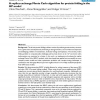Free Online Productivity Tools
i2Speak
i2Symbol
i2OCR
iTex2Img
iWeb2Print
iWeb2Shot
i2Type
iPdf2Split
iPdf2Merge
i2Bopomofo
i2Arabic
i2Style
i2Image
i2PDF
iLatex2Rtf
Sci2ools
126
click to vote
BMCBI
2007
2007
A replica exchange Monte Carlo algorithm for protein folding in the HP model
Background: The ab initio protein folding problem consists of predicting protein tertiary structure from a given amino acid sequence by minimizing an energy function; it is one of the most important and challenging problems in biochemistry, molecular biology and biophysics. The ab initio protein folding problem is computationally challenging and has been shown to be -hard even when conformations are restricted to a lattice. In this work, we implement and evaluate the replica exchange Monte Carlo (REMC) method, which has already been applied very successfully to more complex protein models and other optimization problems with complex energy landscapes, in combination with the highly effective pull move neighbourhood in two widely studied Hydrophobic Polar (HP) lattice models. Results: We demonstrate that REMC is highly effective for solving instances of the square (2D) and cubic (3D) HP protein folding problem. When using the pull move neighbourhood, REMC outperforms current state-of-t...
Related Content
| Added | 12 Dec 2010 |
| Updated | 12 Dec 2010 |
| Type | Journal |
| Year | 2007 |
| Where | BMCBI |
| Authors | Chris Thachuk, Alena Shmygelska, Holger H. Hoos |
Comments (0)

